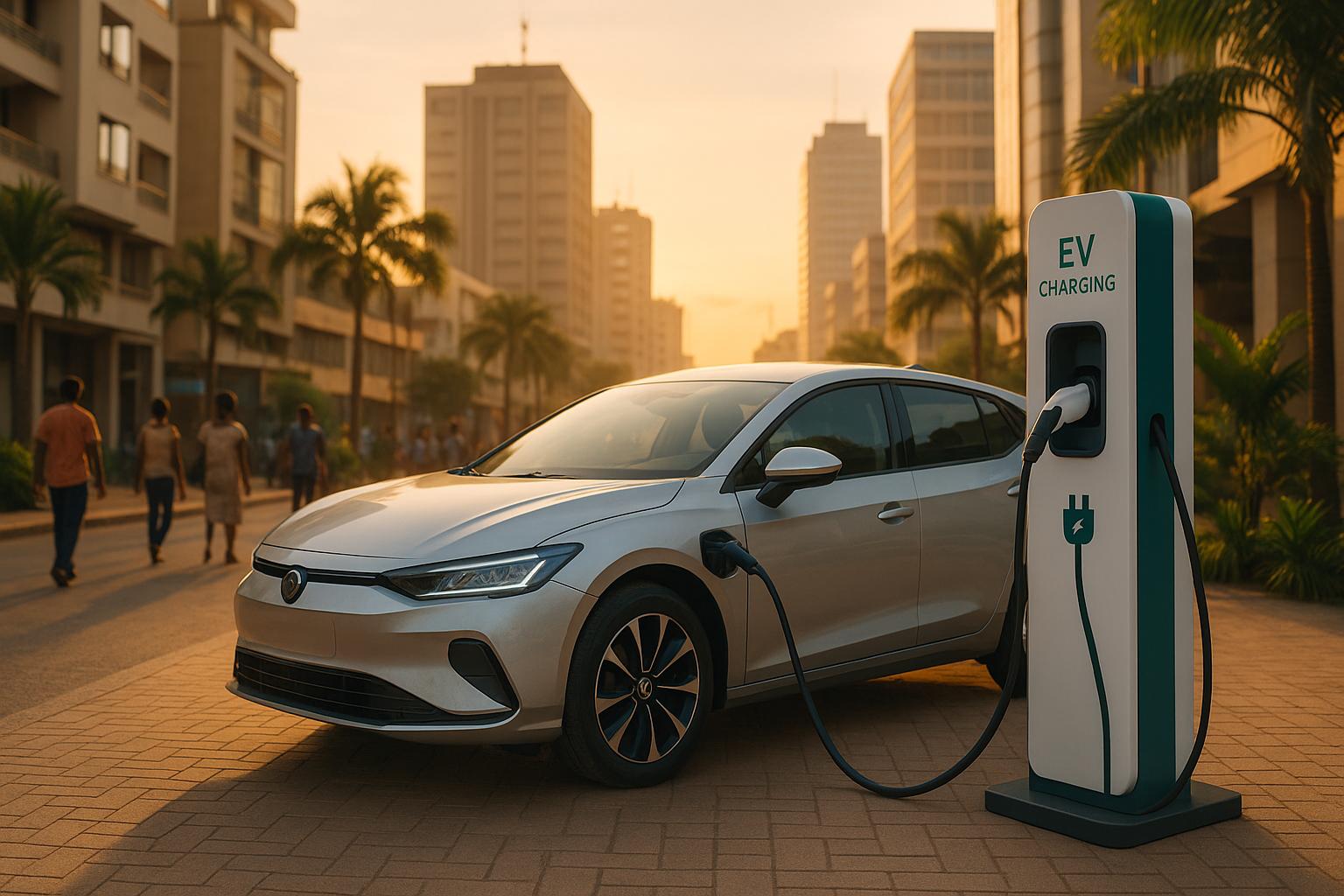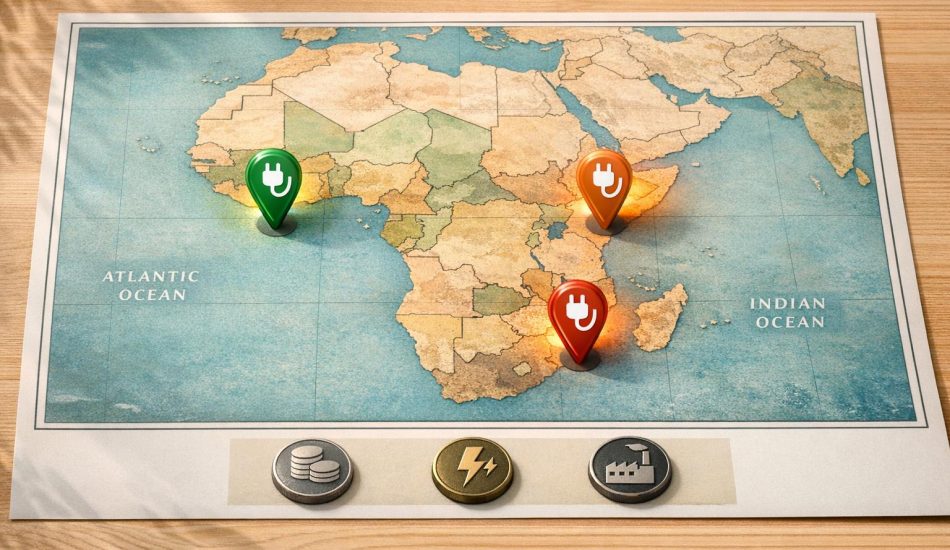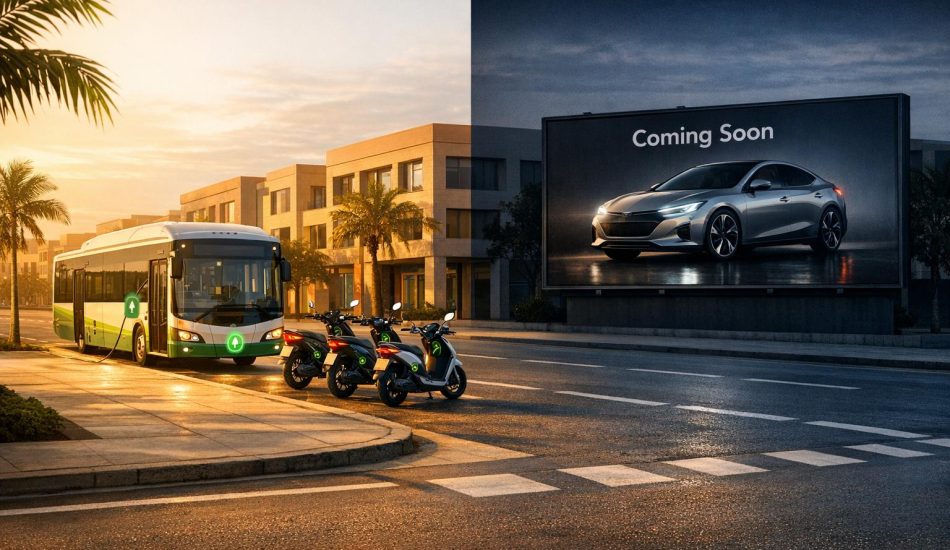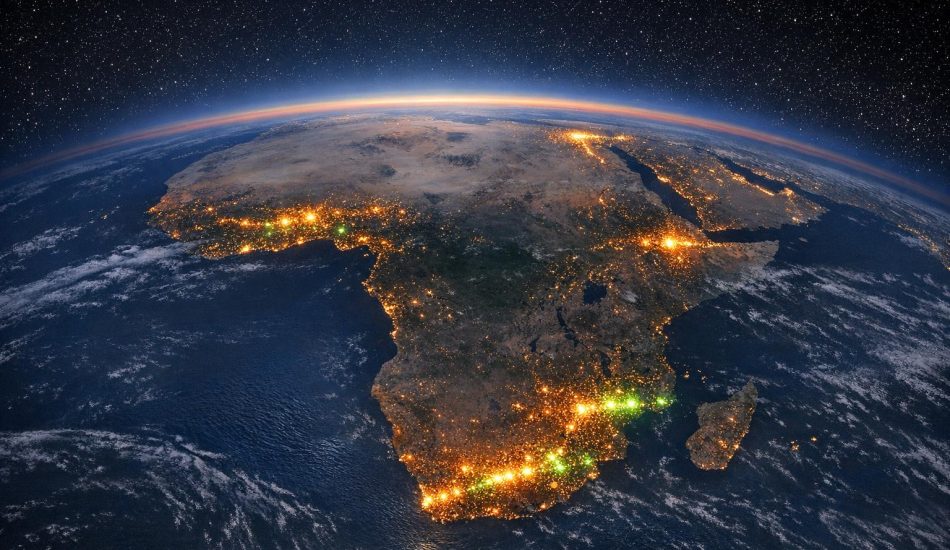
West Africa is seeing a growing interest in electric vehicles (EVs), driven by urbanization, high fuel prices, and air quality concerns. But which countries are prepared to lead this transition?
- Ghana: Strong government policies, tax incentives, and a developing charging network make Ghana a frontrunner. Urban demand is rising, and local assembly investments are encouraged.
- Nigeria: With the region’s largest market, Nigeria is investing in EV infrastructure, including a $100M commitment to charging stations. However, grid reliability remains a challenge.
- Côte d’Ivoire: Early in its EV journey, the country shows potential but lacks clear policies and infrastructure development.
Key Takeaways:
- Ghana offers stability and gradual progress for investors.
- Nigeria has immense market potential but faces infrastructure hurdles.
- Côte d’Ivoire is still assessing its readiness, with untapped opportunities.
For investors and stakeholders, timing and partnerships will be critical to navigating this emerging market.
Nigeria Adopts Electric Cars in Every Sector With These Policies And Improvements
1. Ghana
Ghana is making strides toward expanding its electric vehicle (EV) market. With forward-thinking policies, infrastructure developments, and increasing interest from consumers and businesses, the country is working to overcome challenges associated with EV adoption. Let’s take a closer look at the key areas driving this progress.
Government Policies and Incentives
The Ghanaian government is actively supporting the transition to EVs through a variety of initiatives. Reduced import duties on electric vehicles have made them more affordable compared to traditional cars. Additionally, the government, through the Ghana Investment Promotion Centre, offers incentives to companies interested in setting up EV manufacturing and assembly operations locally. This approach not only reduces costs but also promotes local production, creating jobs and boosting the country’s capabilities in the EV sector.
Infrastructure Readiness
Efforts to build a reliable charging network are underway, with the Electricity Company of Ghana (ECG) and private partners installing charging stations in key urban areas like Accra, Kumasi, and Takoradi. While these stations are mostly concentrated in cities, there are plans to extend the network to major highways, making EVs a viable option for longer trips. At the same time, ongoing upgrades to the power grid are helping to reassure potential EV buyers about the reliability of charging infrastructure.
Market Demand and Growth Potential
Interest in EVs is growing among urban commuters and ride-hailing operators, with pilot programs showing promising results in terms of cost savings and adoption rates. As Ghana’s urban population continues to rise and the middle class expands, more consumers are expected to view EVs as a practical choice. This shift is further supported by the fact that the total cost of owning an EV is becoming more competitive when compared to traditional vehicles.
Investment Opportunities
Ghana’s stable political environment and pro-business policies make it an appealing destination for EV-related investments. The government’s support for local assembly operations – through tax breaks and infrastructure development – creates fertile ground for growth. Additionally, the expanding charging network offers opportunities for partnerships between public and private entities, paving the way for further advancements in the sector.
2. Nigeria
Nigeria offers a dynamic mix of opportunities and hurdles when it comes to electric vehicles (EVs). With its large population and rapidly expanding urban centers, the country is well-positioned to become a key player in West Africa’s EV market. However, challenges like inconsistent infrastructure and grid reliability continue to slow down full-scale adoption.
Government Policies and Incentives
The Nigerian government has taken steps to reshape its automotive sector with an eye on cleaner, more sustainable transportation. These efforts include promoting local EV manufacturing and encouraging the transition to electric fleets. In some states, fiscal incentives have been introduced to support commercial operators making the switch to EVs. While these initiatives are still in their early stages, they set the stage for broader infrastructure improvements and market growth.
Infrastructure Readiness
Nigeria is working to boost its electricity generation capacity, but grid reliability remains a significant issue, especially outside major cities. Despite this, both public and private sectors are actively investing in charging infrastructure to meet the anticipated rise in EV demand. These developments, though gradual, signal progress toward a more EV-friendly environment.
Market Demand and Growth Potential
Nigeria’s urbanization and expanding middle class are fueling interest in electric vehicles. The commercial transportation sector, including ride-hailing and delivery services, stands out as a potential early adopter. For these businesses, the long-term cost savings of EVs compared to traditional vehicles make them an attractive option, creating a ripple effect that could accelerate broader adoption.
Investment Opportunities
The combination of a growing market and evolving policies makes Nigeria an appealing destination for investors. Opportunities abound in areas like local EV manufacturing, the development of charging networks, and innovative financing solutions that make EV ownership more attainable for consumers. These investment avenues could play a critical role in shaping Nigeria’s EV landscape in the coming years.
sbb-itb-99e19e3
3. Côte d’Ivoire
Côte d’Ivoire is taking cautious steps toward adopting electric vehicles (EVs). While neighboring countries like Ghana and Nigeria are making more defined progress, Côte d’Ivoire’s potential remains largely untapped and not yet fully understood. The country is still in the early stages of gathering data on policies, infrastructure, and market trends, leaving much to explore.
Government Policies and Incentives
The Ivorian government appears to be signaling interest in promoting cleaner transportation solutions, though specific policies are still in the early stages of development. These initial efforts could pave the way for assessing the country’s readiness in other critical areas.
Infrastructure Readiness
Preliminary evaluations suggest that Côte d’Ivoire’s existing electricity network and road systems could potentially support an EV charging network in the future. However, no detailed plans or strategies have been made public so far.
Market Demand and Growth Potential
With rapid urbanization and a growing middle class, there are signs that demand for EVs could emerge in the coming years. However, more concrete data is needed to fully understand how this shift might take shape.
Investment Opportunities
There are early indications of promising opportunities in areas like EV charging infrastructure and vehicle assembly. As Côte d’Ivoire’s business environment continues to evolve, it may soon attract investments that could help establish a local EV industry.
Strengths and Weaknesses Comparison
Expanding on earlier discussions about infrastructure challenges and policy gaps, this section examines how Ghana, Nigeria, and Côte d’Ivoire compare in their readiness for scaling electric vehicle (EV) adoption. Each country brings a mix of advantages and hurdles, shaping the direction for investments and policy-making.
Nigeria has taken a bold step with a $100 million commitment to charging infrastructure in the North-East. Private sector efforts, including solar-integrated charging solutions, further bolster progress, though grid instability remains a concern.
Ghana launched its "Drive Electric Initiative" in 2019, which led to the establishment of four charging stations, now extended to Kumasi and Tamale. While this shows promise, the overall infrastructure is still in its infancy.
Côte d’Ivoire is further behind, with only initial assessments of EV infrastructure and minimal government involvement so far. However, the country holds potential if it can learn from its neighbors’ experiences.
The table below provides a side-by-side comparison of key factors influencing EV adoption in these three nations:
| Factor | Ghana | Nigeria | Côte d’Ivoire |
|---|---|---|---|
| Infrastructure Readiness | 4 charging stations established, expanded to Kumasi and Tamale; network still developing | $100M allocated for charging infrastructure (July 2025); private solar-integrated solutions | Initial assessments only; no public infrastructure plans |
| Government Incentives | "Drive Electric Initiative" (2019), supported by the Energy Commission | Backed by Federal Executive Council with major financial commitments for North-East deployment | Early policy development; no specific incentives yet |
| Market Demand | Growing urban middle class and rising consumer awareness | Largest population in the region; strong urban transport needs; active private sector | Market potential tied to urbanization, but limited data |
| Investment Opportunities | Moderate potential with a gradually evolving framework | High potential through government contracts and private sector partnerships | Uncertain potential, with market still in exploratory stage |
While individual country efforts are crucial, regional challenges like limited infrastructure demand a coordinated approach. Currently, West Africa has only 12 EV chargers, but under a proactive policy scenario, nearly 986,000 chargers would be required by 2050. This massive gap highlights both the scale of the challenge and the opportunities for investment.
Nigeria’s large population and robust economy position it as a magnet for investments, with significant potential for economies of scale in the EV sector. Ghana, on the other hand, offers a stable regulatory framework and a track record of early initiatives, making it an attractive option for gradual development. Côte d’Ivoire, though lagging, could emerge as a promising market if it capitalizes on lessons from its neighbors.
Looking ahead, the region faces an anticipated EV-driven electricity demand of 105,000 GWh by 2050, necessitating $20 billion in grid investments. This underscores both the immense challenges and the transformative opportunities awaiting investors in West Africa’s EV landscape.
Conclusion
Nigeria stands out as a promising leader for scaling electric vehicle (EV) adoption in West Africa. With significant investments in charging infrastructure, a large and growing market, and active involvement from the private sector, the country is well-positioned for rapid growth in this space.
Ghana, on the other hand, offers a steady and sustainable path for EV development. Early policy commitments and a supportive regulatory environment have laid the groundwork for advancing its EV infrastructure, making it an attractive option for investors seeking stability.
Meanwhile, Côte d’Ivoire faces hurdles in both infrastructure and policy that need resolution to unlock its potential in the evolving West African EV market. These differing national approaches highlight opportunities for targeted strategies tailored to each country.
For stakeholders, Nigeria presents a chance to capitalize on large-scale infrastructure projects and public-private partnerships, while Ghana’s stable market environment is ideal for mid-sized operations. The region’s rising electricity demand, particularly for solar-powered charging, also opens doors for energy infrastructure companies. Automotive manufacturers and EV importers can tap into Nigeria’s vast market and Ghana’s dependable framework to expand their presence. Platforms like EV24.africa, with its established logistics network spanning 54 African countries, are well-equipped to support market entry and growth.
Success in West Africa’s EV market will ultimately depend on striking the right timing and building strong local partnerships, allowing early movers to secure a foothold as these nations progress toward full-scale EV adoption.
FAQs
What challenges does Nigeria face in improving its electricity grid for EV adoption, and how can these be resolved?
Nigeria is grappling with significant hurdles when it comes to upgrading its electricity grid to support electric vehicle (EV) infrastructure. Frequent power outages, fluctuating voltage levels, and limited generation capacity create major challenges for providing dependable charging options for EV users.
One potential solution lies in implementing smart grid technologies. These systems can monitor and identify faults in real time, helping to improve grid stability and efficiency. Alongside this, incorporating renewable energy sources such as solar and wind into the energy mix can help diversify power generation and reduce reliance on the current grid. These steps are crucial for building a more reliable and adaptable power system, paving the way for the growth of EV infrastructure in the country.
How will Ghana’s incentives for local EV assembly impact its automotive industry and job creation?
Ghana is taking bold steps to strengthen its automotive industry by offering incentives like tax breaks and import duty waivers for local electric vehicle (EV) assembly. These measures are designed to encourage domestic manufacturing and draw investments from both local and international players, paving the way for growth in EV production and its supporting industries.
This strategy is expected to generate thousands of jobs across various sectors, including vehicle assembly, maintenance, and supply chain operations. On top of that, it positions Ghana as a frontrunner in West Africa’s shift toward greener transportation, promising lasting economic gains while addressing environmental concerns.
How can Côte d’Ivoire boost its readiness for EV adoption, and what can it learn from Ghana and Nigeria’s progress?
Côte d’Ivoire has the potential to speed up the adoption of electric vehicles (EVs) by targeting a few critical areas. Offering tax incentives to EV buyers, expanding the network of charging stations, and encouraging partnerships between public and private sectors are all key steps. These measures can help establish a more welcoming environment for EV growth.
Looking at neighboring countries provides useful insights. Ghana, for instance, has made strides in crafting EV-friendly policies, while Nigeria has prioritized developing local expertise and investing in infrastructure. By tailoring these strategies to its own needs, Côte d’Ivoire can make the shift to electric mobility more seamless and position itself to attract greater investment in its EV industry.




